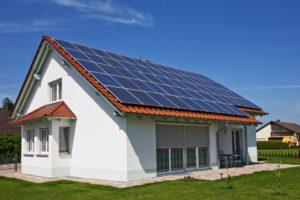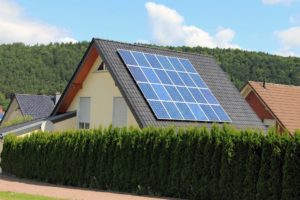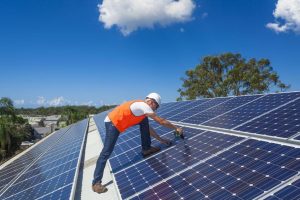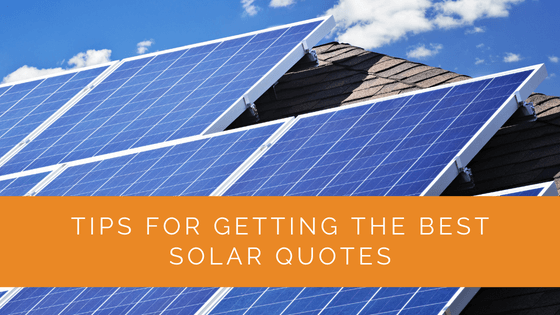As a homeowner, you may have considered going solar to reduce your electricity bill and do your part for the environment. However, getting a solar quote and choosing a solar installer can be overwhelming. Many solar companies and salespeople are vying for your business, and it can be difficult to compare quotes and determine the best fit for your home. This article will provide tips for getting the best solar quotes and choosing the right installer for your home.
Contents
Key Takeaways
- Understanding your energy needs and assessing your electricity consumption is the first step in getting the best solar quote.
- Researching solar providers by checking licenses, reading reviews, and comparing prices is crucial in making an informed choice.
- Preparing for a site visit and evaluating quotes, including services and warranties, will help you choose your home’s solar installer.
Understanding Your Energy Needs
The first step in getting the best quote is understanding your energy needs. This includes assessing your energy usage and determining the size of your solar panel system.
Assessing Your Energy Usage
You must gather information about your electricity consumption to assess your energy usage. The easiest way to do this is to look at your electric bill. Your electric bill will provide information on how much electricity you use each month and the peak hours of usage.
Another way to assess your energy usage is to use a home energy calculator. These online calculators will help you estimate your energy consumption based on your home’s size, appliances, and other factors.
Determining the Size of Your Solar Panel System
Once you understand your energy usage, the next step is determining the size of the solar panel system you need. The size of your solar panel system will depend on your energy needs and the size of your roof.
A solar installer will use information about your energy needs and roof size to design a solar panel system that is the right size for your home. They will also consider shading, orientation, and local weather patterns.

Researching Solar Providers
The next step in getting the quote is researching solar providers. This includes checking for licenses and certifications, reading reviews, and comparing prices.
Checking for Licenses and Certifications
When researching solar providers, checking for licenses and certifications is important. A reputable home solar installer will have all the licenses and certifications your state requires. This is important because it ensures that the solar equipment and installation will be done to the highest standards.
Reading Reviews and Comparing Prices
Another important step when researching solar providers is reading reviews and comparing prices. Many solar companies and salespeople are vying for your business, and comparing solar quotes cannot be easy.
When comparing quotes, it is important to look at the quote’s details, such as the type and quality of the solar equipment, the size of the solar panel system, and the warranty. It is also important to compare prices and to be wary of sales tactics that may be used to get you to sign a contract before you are ready.

Preparing for a Site Visit
Preparing for a site visit is the next step in getting the solar quote. This includes gathering information on your property and preparing a list of questions for the solar installer.
Gathering Information on Your Property
Gathering information about your property is important before the installer arrives for the site visit. This includes information about the size of your roof, the orientation of your home, and any shading that may affect the solar panel system’s performance. It would be best if you also noted any obstacles, such as trees or buildings, that may affect the installation of the solar panel system.
Preparing a List of Questions for the Solar Provider
Preparing a list of questions for the solar installer is also important. This will help you better understand the solar panel system, installation process, and costs. Some questions you may want to ask include the following:
- What type of solar equipment do you use?
- How do you determine the size of the solar panel system?
- How long will the installation take?
- What warranties do you offer on equipment and installation?
- How do you handle maintenance and repairs?
- What kind of monitoring and reporting system do you use?

Evaluating Quotes and Choosing a Provider
The final step in getting the best quote is evaluating and choosing a provider. This includes comparing quotes and services and negotiating and finalizing a contract.
Comparing Quotes and Services
Once you have received quotes from different solar installers, it is important to compare them. It would be best if you compared the cost of the solar panel system, the quality of the equipment, the size of the solar panel system, and the warranties offered. It is also important to compare the services, such as monitoring and maintenance.
Negotiating and Finalizing a Contract
After comparing quotes and services, you should choose a solar installer you feel comfortable with and believe will provide the best service. Once you have chosen an installer, it is important to negotiate and finalize a contract. The contract should include all the details of the solar panel system, the installation process, and the costs involved.
Expert Insights From Our Solar Panel Installers About Getting the Best Solar Quotes
Understanding your energy needs is crucial. An accurate assessment of your electricity consumption helps tailor the solar system to meet your specific requirements, ensuring maximum efficiency.
Senior Solar Technician
Researching solar providers thoroughly, checking for licenses, certifications, and reading reviews can make a significant difference in the quality of installation and long-term performance of your solar system.
Lead Solar Installer
Prepare for the site visit with detailed information about your property and ask relevant questions. This ensures you get a comprehensive and transparent quote tailored to your home’s needs.
Certified Solar Engineer
Experience Solar Excellence with Us!
Trust in Solar Panels Network USA, where our seasoned experts deliver top-quality solar solutions for homes and businesses nationwide. With a legacy of countless successful installations and a commitment to sustainable energy, we’re your reliable partner in the solar journey. Ready for a brighter, eco-friendly future? Call us now at (855) 427-0058 and harness the sun’s power!
Conclusion
By understanding your energy needs, researching solar providers, preparing for a site visit, evaluating quotes, and choosing a provider, you can be confident that you are getting the best quote and choosing the right solar installer for your home. It’s important to take the time to do your research and not rush into signing a contract. It’s also important to compare quotes and services and negotiate and finalize a contract in your best interest.
Going solar is a big decision, but it can be a great investment for your home and the environment. By following these tips and investing in a solar power system, you will be well on your way to reducing your electricity bill and taking advantage of the benefits of solar energy.
FAQ
What should I look for in a solar quote?
When looking for a solar quote, you should pay attention to the following details:
- the type and quality of the solar equipment
- the size of the solar system
- the warranties offered on the solar equipment and installation
- the cost of the solar panel system and installation
- the services offered, such as monitoring and maintenance
How many solar quotes should I get?
Getting at least 3-5 solar quotes from different solar installers is recommended to ensure you get the best deal. This will also allow you to compare quotes and services and make an informed decision.
How do you evaluate a solar quote?
When evaluating a quote, you should compare the cost of the solar panel system, the quality of the solar equipment, the size of the solar panel system, and the warranties offered. It is also important to compare the services, such as monitoring and maintenance.
What should I look for when choosing a solar company?
When choosing a solar company, it’s important to look for a company with a good reputation, has been in the business for a while, and has a team of certified and experienced installers. It’s also important to ensure the company is financially stable and can provide warranties and insurance for equipment and installation. Additionally, it’s important to check the company’s reviews and customer feedback.
What are the main components of a solar system?
The main components of a solar system include:
- Solar panels: These convert sunlight into electricity.
- Inverter: This converts the electricity produced by the solar panels from DC to AC, the type of electricity used in most homes and businesses.
- Mounting system: This holds the panels in place on the roof or ground.
- Battery storage: This stores the electricity produced by the solar panels for use during periods of low sunlight or power outages.
- Solar monitoring system: This allows homeowners to monitor their solar system’s performance and track energy production.
- Electrical disconnect: This allows the homeowner to safely shut off the solar system in an emergency.
- Racking system: This is the frame that holds the panel.
- Wiring: This connects all the solar system components and allows electricity to flow.
Not all solar systems have all these components, and it depends on the homeowner’s specific requirements and the installer’s proposal.
About the Author
Solar Panels Network USA stands at the forefront of solar energy solutions, driven by a team of seasoned solar engineers and energy consultants. With over decades of experience in delivering high-quality solar installations and maintenance, we are committed to promoting sustainable energy through customer-centric, tailored solutions. Our articles reflect this commitment, crafted collaboratively by experts to provide accurate, up-to-date insights into solar technology, ensuring our readers are well-informed and empowered in their solar energy decisions.

